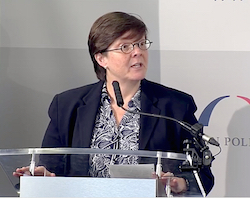
More than half of respondents to a recent poll about Alzheimer’s disease greatly underestimated the costs of long-term care.
Hart Research Associates conducted the survey Oct. 18 to 23 on behalf of Maria Shriver’s Women’s Alzheimer’s Movement and the Bipartisan Policy Center. A nationally representative sample of 800 Americans were surveyed online, with an additional 100 interviews among millennial women and millennial men. The release of the results coincide with the start of National Alzheimer’s Disease/ National Family Caregivers Month.
Among the findings:
- 54% of all Americans said that long-term care will cost $25,000 or less per year. Almost half of millennials said they believed that long-term care will cost less than $18,000 per year. National median costs for assisted living rose to $45,000 in 2017, according to the recently released Genworth 2017 Cost of Care Survey, and specialized memory care communities can be more expensive.
- 66% of Americans said they want a family member to be their primary caregiver. Only 25% of older adults said they have had the conversation with their children, however, and only 33% of millennials said they have talked with their parents about the issue.
- 68% of American women, and 64% among millennials, said they would be likely to make changes to their lives if they thought there was something they could do to reduce their risk for cognitive decline and Alzheimer’s disease.
- Women make up two-thirds of the caregivers in America, yet 54% of American women reported that they are ill-prepared to take care of their parents, and 50% of millennial women reported feeling that way.
“Most Americans are unaware of their risk of Alzheimer’s, unprepared to be a family caregiver, and uninformed about the cost of care,” said Katherine Hayes, director of health policy at the Bipartisan Policy Center. “Individuals and family caregivers in need of long-term services and supports, such as bathing, dressing and medication management, often face devastating out-of-pocket costs. These survey results should prompt every family to sit down together and make a plan for addressing their long-term healthcare needs.”
Watch Maria Shriver preview the survey results Nov. 1 at her first summit on women’s brain health in New York City:



